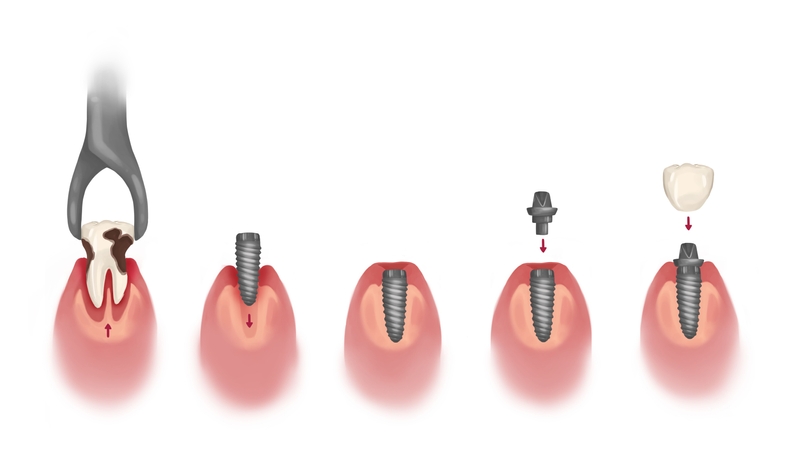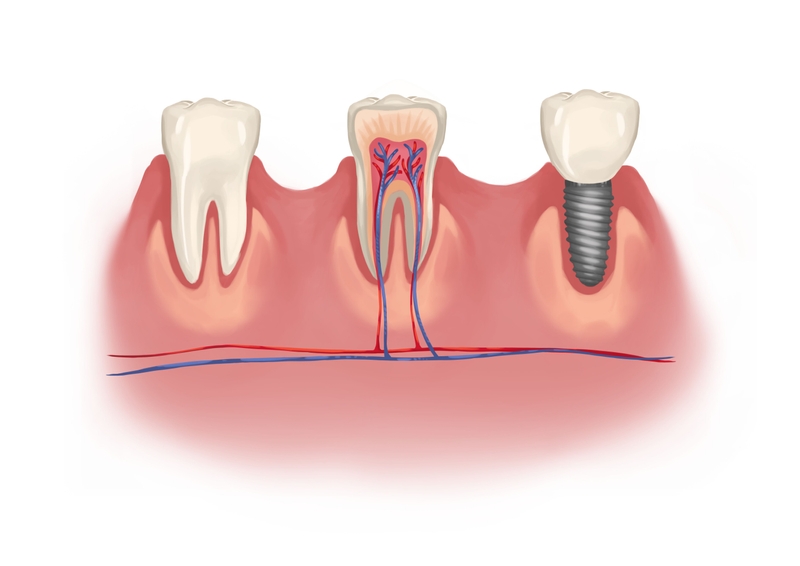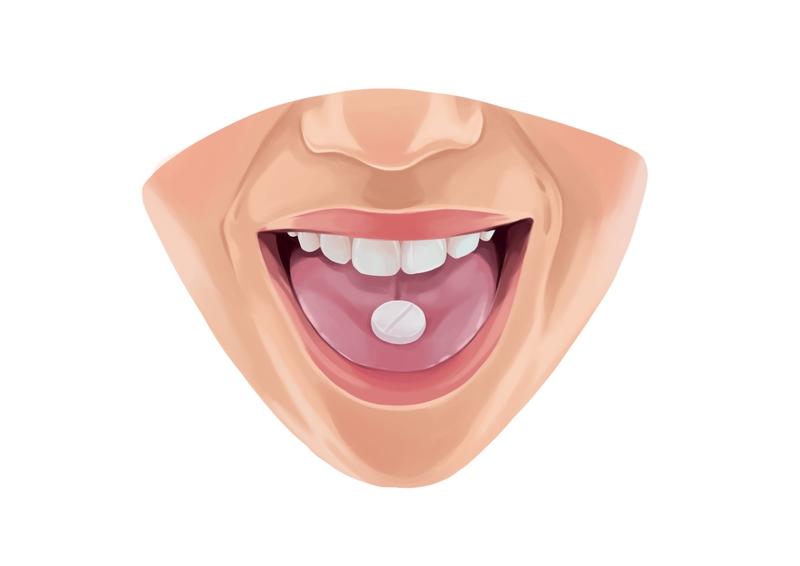- Pain after placing an implant is normal. It may last for about 3 days and is similar to the sensations after tooth extraction.
- To relieve the pain, you can try painkillers, applying ice to the affected area, and avoiding hard and crunchy foods.
- If the pain does not go away, you should see your doctor as soon as possible.
Urgent dental implant problems? Use Authority Dental to quickly find a dentist open now near you.
Are you worried about pain after having a dental implant placed? Here's everything you need to know.
Is getting dental implants painful?

Picture by Authority Dental under CC 2.0 license
Pain from a dental implant procedure is often compared to that of a tooth extraction. You can bear it.
Harry Lee, DMD, explains: "The question, 'Do dental implants hurt?' is the number one concern I hear from patients, and my simple answer is usually 'Not as much as you think, and certainly less than the problem we are fixing.' Patients often fixate on the day of surgery, but because we use adequate local anesthesia—and sometimes sedation—the procedure itself is usually painless."
"You genuinely feel pressure, not pain," he emphasizes.
However, it is worth noting that implants can hurt not only on the day of surgery. You may feel discomfort much earlier, during the preliminary stages. Patients even claim that those can be more uncomfortable than the implant placement itself.
Preliminary procedures
There are cases when patients need to prepare for surgery. This could have different causes, such as a bone to be augmented, sinuses to be lifted, or teeth to be removed. You might not need any of these. It is your dentist's discretion.
Bone grafting is usually performed under local anesthesia. This procedure increases the volume of the jawbone. You might receive a prescription for a painkiller and an anti-inflammatory medicine after you leave the office.
Sinus lifting has been reported to be particularly unpleasant. The surgery lasts over an hour. You are definitely going to receive local anesthesia and may even be sedated. After a few hours, you will start to feel some pain in your upper jawbone, on your face, and maybe even in your nose.

Some teeth may need to be extracted before implantation. This may be because they are so damaged that they need to be replaced. The most common reason, though, is when the patient is having a full arch replaced. In that case, the remaining dentition is pulled.
Placement surgery
The surgery itself is minimal in discomfort, as you will be under anesthesia. You may start to feel some pain 2-4 hours after leaving the office, and it will wear off. Because of the careful planning involved, nerves in the bone are almost always undisturbed. There might be some pain in the gums instead.
You are likely to wear a healing cap for 2 weeks. That might cause minor irritation to your gums, but it should not be excruciating.
Loading of restoration
The abutment and crown may have to be placed a few months later, after a period of healing. The procedure can be mild. A local injection should numb the pinching pressure you might otherwise feel in the gums. You will likely not need to use any painkillers afterward.
Tooth implant pain after surgery

Picture by Authority Dental under CC 2.0 license
Some pain during implant recovery is to be expected. Placement is an invasive procedure, and soreness is the body’s natural response. Most commonly, it lasts 3 days after the surgery and is relatively mild. You should not need to take painkillers for longer than a week.

Problems start when the pain does not go away with healing.
| TIME | DESCRIPTION |
|---|---|
| A couple hours after the procedure | As the anesthesia wears off, you will feel less and less numb. Slight throbbing pain might appear in the area, as well as irritation of the gums. |
| Week 1 | Pain or pressure at this stage is still likely, especially on impact (when you’re chewing or clenching your teeth). It is common for patients to continue taking OTC painkillers during this period. The pain commonly disappears 72 hours after the surgery. |
| Week 2 | You should not feel any dental implant pain after about 2 weeks. If you do, this could be a sign of infection. Contact your dentist immediately. |
| 3-4 months after the procedure | If you are still experiencing pain a couple weeks after surgery, this could be a sign of infection, nerve damage, or an otherwise failed implant. Reach out to your dentist as soon as possible. |
It is important to keep an open line of communication with the doctor after the implant is placed. You will likely have 1 or 2 check-up visits scheduled, so make sure to disclose any concerning symptoms at those visits.
If severe pain is associated with looseness, both soon after the surgery and years later, you might have to get your implant removed.

How can I ease dental implant pain?

Picture by Authority Dental under CC 2.0 license
Pain management relies mainly on closely following your dentist’s post-op instructions and providing excellent dental implant aftercare. There are a couple of other things you can do to decrease any pain associated with implant placement.
Go with an experienced dentist
Choosing the right specialist to perform the job is key. Make sure to go with someone who has placed many implants before with a high success rate. Such experts usually have hundreds of before-and-after photos and strong online reviews.
It may be tempting to go with someone who charges much less than their competitors, but this could put you on a path to complications. Those are not only painful and inconvenient but can also be very expensive to fix.
Take the appropriate medications
In addition to taking any drugs your dentist prescribed according to instructions they gave you, you may also be taking medications for other conditions. Make sure to disclose anything to your dentist prior to the procedure.
This is very important because some drugs (such as anxiety or heartburn medications) can hurt healing. Some may even lead to implant failure. It is also essential to keep chronic conditions well-controlled, especially diabetes, as this helps allow for favorable healing.
Brush and floss your teeth
Keeping up oral hygiene during the healing period is vital. Your gums need a clean environment without any contamination to recover. What is more, issues like gum disease or tooth decay can be detrimental not only to implant success but also to your overall health during this period.
Brush and floss after every meal and use non-alcoholic mouthwash to disinfect your mouth. It is recommended to do this at least 3 times a day for a week after your surgery. After that, visit your dentist for regular cleanings 1-2 times per year.
Take advantage of home remedies for pain
You can numb discomfort during the first days after the procedure by using ice packs. Place them on your face, close to the implant, for 30 minutes on, 30 minutes off.
Bite down on a moistened tea bag if you feel a metallic taste in your mouth. The tannic acid helps constrict vessels.
Use a warm (but not hot) saltwater solution to rinse your mouth after every meal. You should avoid the implant site when brushing to prevent gum irritation. This solution can help remove food debris and prevent it from breaking down on your teeth and soft tissues.
Stick to an appropriate diet
Hard and sticky snacks are off-limits for a few weeks after the procedure. Eat soft foods, or even blend whatever you feel is uncomfortable to chew. Still, keep your diet rich in vitamins and nutrients, which help your body heal quickly and efficiently.
Do not drink or eat anything hot the day you get back home. Avoid using straws for a few days, as the sucking motion could rip blood clots away from the implant site.
Refrain from smoking and alcohol
Smoking is just about the worst thing you could do when it comes to your dental implant. Cigarettes slow down healing and make your mouth vulnerable to infections. You must quit smoking for at least 2 months after your implant surgery.
Alcohol can likewise impede healing. The first 72 hours are when you should not touch it at all. After that, try not to binge drink at least, and adhere to official recommendations as to units per day.
Get enough rest
The body regenerates best when sleeping. Make sure to get your 8 hours every night. Moreover, avoid strenuous activity for at least a week. Exercising can wait.
Most patients return to work the next day after having an implant placed, but procedures like sinus lifting and bone grafting may require more downtime. Your dentist will let you know how much time off you should organize.
FAQ
Are you put to sleep for dental implants?
Placing dental implants usually does not require anesthesia. Most commonly, the patient is given a local injection and IV or oral conscious sedation. The latter two will make you drowsy but aware of your surroundings. You might not remember the procedure.
If you suffer from dental anxiety, have a low tolerance for pain, or are having many teeth removed and multiple implants inserted, you may have to go under general anesthesia.
Is it normal to have throbbing pain after a tooth implant?
Throbbing pain or pressure is common for a few days after the surgery. It might appear as the anesthetic starts to wear off. If your doctor prescribed any painkillers, take them as directed. Otherwise, settle for OTC products, ideally non-NSAID, like paracetamol.
If you have had your implant for a while and suddenly start to feel throbbing pain, contact your dentist immediately.
Why do my dental implants hurt?
Some pain is part of the recovery period. The first few days up to 2 weeks might be uncomfortable. Take prescribed medications or OTC products to manage the soreness.
Let your doctor know if pain continues beyond this period. You are likely to have a check-up 1-2 weeks after the procedure. This is a good time to disclose any discomfort you are feeling.
What affects pain intensity after implant placement?
Your adherence to post-op instructions and the number of implants placed impact the pain level the most. An inappropriate diet, smoking, or strenuous activity can increase pain and slow down healing.
Your mouth recovers more slowly from lower arch implant placement, but this does not necessarily mean more pain. Either way, the more implants, the more invasive the procedure, the more soreness you might feel.
Is dental implant pain years later concerning?
Yes. You should not have any discomfort after the initial healing period. Infections, however, can persist for a long time. If the pain lasts longer than a week, it may be a good idea to visit a dentist for an X-ray to make sure everything is okay.
Richard Hattaway, DDS
A biological membrane is often used for larger bone grafts to prevent the patient's body from reabsorbing the material before it can fulfill its purpose.